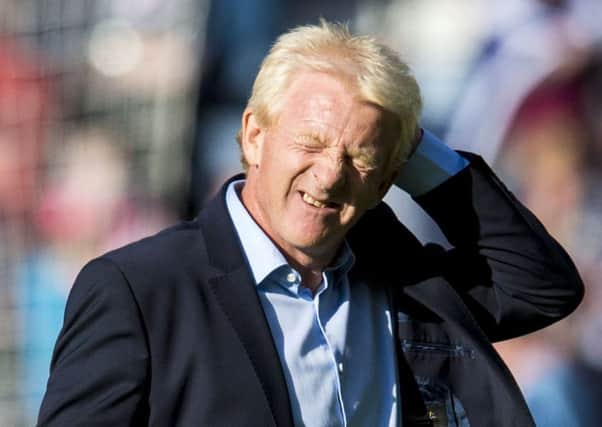Gordon Strachan believes Scotland can qualify for World Cup


The national coach admitted his side will now have to win all four of their remaining qualifying games and hope England, top of Group F by two points from Slovakia and six ahead of Scotland, do the same.
It would appear to be clutching at straws, particularly given Scotland have managed to win just two games – and one of them against group minnows Malta – but Strachan claimed more performances like this one which almost ended England’s record of not having lost a qualifying match in eight years, give him belief.
Advertisement
Hide AdAdvertisement
Hide AdTwo stunning free-kicks from Leigh Griffiths in the space of three minutes – described by Strachan as the best he’s ever seen from a player in a dark blue shirt – appeared to have earned Scotland their first home win against the Auld Enemy since 1985 after Alex Oxlade-Chamberlain had given England the lead.
But the Scots were left shattered as Harry Kane, captain of his country, stole in to equalise three minutes into added-on time.
It was, to say the least, a cruel blow but even so Strachan refused to throw in the towel. Asked if he still believed Scotland can be in Russia next summer, he said: “I would not be here if I did not believe that.”
Although admitting to being emotionally drained, Strachan revealed he was already looking forward to teaming up with his squad for their next matches, a double header away to Lithuania and home to Malta in September.
Advertisement
Hide AdAdvertisement
Hide AdHe said: “I always get excited when we get together. I love working with the players. They have their faults but it’s not their faults, it’s the Scottish game. We have to improve, but that’s a different story. We could talk all night about the things we need to do to improve but how can you improve their work-rate?”
Asked if he now hoped Gareth Southgate’s England can now do Scotland a favour by winning their final four matches, he said: “I hope so. In 35 games, that’s the closest they have been to losing that record – that’s for sure.”
And he pointed to the vast gulf which exists between the players Southgate can call on compared to those at his disposal, citing, for example, the English centre back pairing of Manchester United’s Chris Smalling and Chelsea’s Gary Cahill as opposed to the Scots Christophe Berra and Charlie Mulgrew whose Blackburn Rovers will start next season in League One in England.
Admitting he felt he had been robbed of his best-ever result as a manager, Strachan, insisted he’ll remember the crescendo from the Tartan Army which followed Celtic striker Griffiths’ second goal forever.
Advertisement
Hide AdAdvertisement
Hide AdHe said: “A lot of us in football will remember it. When you leave the game if you can leave memorable moments you have given something to the game.”
To that end, he praised the mental strength of former Hibs star Griffiths as he stepped up to take those free-kicks with only four minutes left on the clock. He said: “To be able to do that with the whole world watching you after running about as he did.
“Some can do it after twenty minutes when they are fresh, but after the work he had put in? I just knew the second one was going in .. I really did.
“I’d seen the best free-kick for Scotland then I saw the second. I’ve seen some great Scotland goals but to stick them in against probably the tallest wall you could put up in European football ... Leigh’s a wonderful character, strange, but wonderful.”
Advertisement
Hide AdAdvertisement
Hide AdSouthgate, too, praised Griffiths’ strikes although questions were raised as to the culpability of his goalkeeper Joe Hart. Insisting he would have to see them again to decide whether Hart might have done better, he said: “They were two brilliant finishes.”